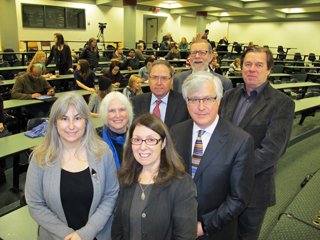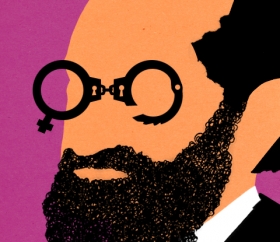By Lucianna Ciccocioppo / Illustration by Justin Renteria
Leading constitutional and human rights players gathered at the Faculty of Law on January 29, 2013, for a stimulating discussion to mark the momentous Supreme Court of Canada decision that struck down the country’s restrictive abortion law a quarter century ago.
“R v Morgentaler: Reflections After 25 years” drew a panel of lawyers, academics and activists to speak about the impact of the landmark SCC decision on January 28, 1988: Dr. Robert Scott (appellant and co-accused), Morris Manning, QC (counsel for Dr. Henry Morgentaler and his co-accused), Faculty of Law constitutional scholar Prof. Lorraine Weinrib, and Carolyn Egan (founding member of the Ontario Coalition for Abortion Clinics and an expert witness at the trial). Globe and Mail justice reporter Kirk Makin, who covered the story, also spoke (click here to watch a webcast of the panel discussion).
“The day that decision came down was an extraordinary day in Canada,” said Makin. “And I hope that people in this room have a chance to experience that because it was history in the making.”
About 200 people filled the Bennett Lecture Hall, including many law students and a contingent of journalism students from Ryerson University, some likely too young to even remember the issue—and what was at stake. But it’s an issue that is still relevant today, stressed Manning.
“Abortion was—and probably still is—the most discussed legal issue in jurisprudence,” said the lawyer who led the case to increase access to abortion services right up to the Supreme Court of Canada.
“The Supreme Court had finally showed it did justice and did right.” Manning spoke of the euphoria in the courtroom that day, and the celebration in the streets, across Canada, and said the victory was constitutionally significant as well, given the new Charter of Rights and Freedoms.

Back: Morris Manning, Dr. Robert Scott, Kirk Makin.
Middle: Carolyn Egan, Paul Schabas.
Front: Cheryl Milne, Prof. Lorraine Weinrib.
Weinrib agreed. “Suddenly the doors of the courtroom were opened to the outside world. This was such a revolutionary change; it made the constitution relevant to people’s lives.” She was working as a government litigator for the Ontario Ministry of Justice at the time.
“In the microcosm of this case, you can see [Prime Minister] Pierre Trudeau’s vision had materialized. He wanted a strong set of rights, and set up the Supreme Court of Canada to operate as a constitutional court. And it was transformed from a private law court to a public law court, and suddenly, this was all falling into place. The platform was the Morgentaler case, which for a long time nobody thought was winnable.”
Co-moderator Cheryl Milne, executive director of the David Asper Centre for Constitutional Rights, which hosted the event, agreed. She lauded the prominence of the Charter and its importance at the forefront of the case.
Dr. Henry Morgentaler, a physician trained in Quebec, arrived in Toronto from Montreal in the 1980s to open an abortion clinic with Dr. Robert Scott and one other physician. The clinic violated the law at the time: access to abortions was restricted to hospitals, upon approval of a three-man therapeutic committee, which likely never knew the women or met with them, or even met with each other. Not all hospitals performed the services, some had quotas on the number performed per day, and some hospitals didn’t have these committees at all. Women were made to wait for approvals, if they were even approved. Some were forced to go to clinics in Montreal—where Quebec juries refused to convict Morgentaler—or some crossed the border to Buffalo.
“It took the decision to have an abortion out of the hands of women,” said Egan. “But there was privileged access. If you were upper income and had a gynecologist, you could have one, or you could afford to go elsewhere. But if you were a new immigrant or a First Nations woman with low income, it was impossible to get access. Think of the factory worker who had to work, or a high school student. They were made to leap through hoops and faced barriers. It was a totally inequitable law—classist and racist.”
Weinrib pointed to the evolution of women’s reproductive healthcare, which had moved away from traditional midwifery and into hospitals. As justice minister, Trudeau introduced an omnibus bill to decriminalize many aspects of sexual health: he introduced the therapeutic exemption; decriminalized the sale and advertising of contraceptives; and legalized same-sex relationships between adults.
“So the abortion debate was interesting, because it wasn’t a debate between pro-life and pro-choice, but with the medical profession who wanted to control abortion…through the form of criminalization,” Weinrib explained.
Added Manning: “Many doctors wanted to provide abortion services without fear of charges—in essence to legalize what was already being done.”
Still, co-moderator Paul Schabas, of Blake, Cassels & Graydon LLP and co-counsel for the appellant, highlighted that access issues remain in certain parts of Canada: there are no abortion clinics in PEI, and clinics are not provincially funded in New Brunswick. “In Ontario, we have Conservative MPPs who want to try to defund abortions.”
Political strategy is paramount, said Egan. “We had to organize that and make clear that people working together can collectively make change, and in certain times, like Henry, make history.”
Photo by Lucianna Ciccocioppo


